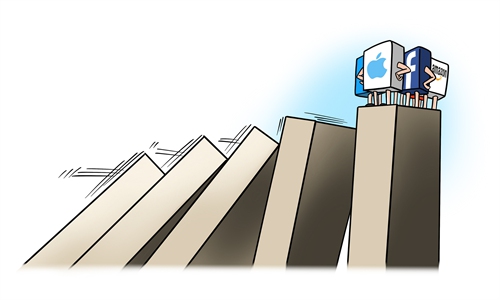
Illustration: Liu Rui/GT
The book Educated: A Memoir of Tara Westover, an American historian and writer, published in February 2018 soon became a bestseller. Bill Gates recommended it, saying, "An amazing story, and truly inspiring. It's even better than you've heard."
The book's Chinese edition was published in July 2020. The title in Chinese is a translation of "flee like a bird to your mountain" - a sentence from within the book. The Chinese edition is also very popular. On dangdang.com alone, China's largest online book retailer, the book has so far received more than 1.1 million comments with over 99.9 percent saying it is good.
Born in 1986 and raised in the US state of Idaho by a father who opposed public education, she never attended school. According to her bio, Westover was 17 the first time she set foot in a classroom. After that, she pursued learning for a decade, graduating magna cum laude from Brigham Young University and subsequently winning a Gates Cambridge Scholarship. Currently, she is a senior research fellow at the Shorenstein Center at Harvard. This is a typical inspiring story, and her success originates from education.
After finishing reading the book, I have had trouble convincing myself that the story happened in the contemporary US. This seems like it would have taken place in the 1950s to 1960s with a young person hailing from some village as the protagonist.
The US today is an educational powerhouse. According to the Brookings Institution, for decades the percentage of 18-24 year-olds who completed high school with a regular diploma or GED (General Educational Development) hovered around 85 percent. This percentage increased to 93 percent between 2001 and 2016. Unexpectedly, there are still families like the Westovers in the US. Those parents don't allow their children to go to school. Instead, the kids spend days working in the family's junkyard and stewing herbs.
Westover's inspiring story reflects the fact that education is still rare and inaccessible for many young Americans.
This reminds of another book, Hillbilly Elegy: A Memoir of a Family and Culture in Crisis by Vance, J. D.. He tells his story of growing up in a poor Rust Belt town, although he later graduated from Ohio State University and Yale Law School. He is now a principal at a leading Silicon Valley investment firm. However, almost all of his family - his grandparents, aunt, uncle, sister, and, most of all, his mother - have struggled profoundly due to changes in the manufacturing industry.
They are desperate, especially the young people. In the city of Middletown, Ohio, where Vance lived, about 20 percent of students drop out of high school before graduation. Vance's experience is more than rare in his city - and it has shown us another side of US society.
For many Chinese readers, the stories of Tara Westover and Vance J. D. are compelling, because the most outstanding tradition of the Chinese nation is attaching great importance to education.
Chinese readers love such stories because some of them are protagonists of similar stories in which education changes a person's entire life. I have a friend of ethnic Yi who was born in the deep mountains in Southwest China's Sichuan Province. He managed to get diplomas from renowned universities in China and the US. Today, his hometown has eliminated poverty and children there can enjoy sound primary education as well as 15-year free education.
As a matter of fact, the great story of China's reform and opening-up is composed by a large number of stories like this one in Sichuan. China's great story is yet to be completed, and there will be more inspiring chapters to be written.
Recently, a photo that shows Chinese students waiting in line outside the US Consulate in Shanghai to apply for visas has been circulating on Chinese social media platforms. Even if China-US relations are at a low ebb, thousands of Chinese students and their families are still preparing to go to study in the US and Europe.
This mirrors the advantage of US education. It also shows the Chinese tradition of attaching importance to education.
It is believed that those students who were lining up have received good primary education in China. They might have also encountered some obstacles in gaining knowledge. But most of them do not need to confront challenges like Westover and Vance once had, who had to try hard to break backward religious traditions and the quagmire of the retrogressive social environment.
It is reported that the US recently rejected visas for more than 500 Chinese students who plan to pursue postgraduate studies in STEM (science, technology, engineering, and mathematics).
Granted, the US has the right not to accept their visa applications. But the US cannot curb their desire to study and pursue personal development.
Enabling more children from relatively poor areas to head toward and integrate into the modern era through education is a common challenge both China and the US face.
China's education sector has worked hard to achieve a 95 percent completion rate of nine-year compulsory education as of the end of 2020. It is now seeking to increase high school enrollment among rural children.
The US is now facing an even more dire situation in terms of dropout rates, which exceeds 20 percent in high schools in some states. COVID-19 exacerbates this problem.
Isolating competitive Chinese students outside the US won't tackle US' education problems - nor help those who come from disadvantaged backgrounds like Westover and Vance.
The author is a senior editor with People's Daily, and currently a senior fellow with the Chongyang Institute for Financial Studies at Renmin University of China. dinggang@globaltimes.com.cn. Follow him on Twitter @dinggangchina


